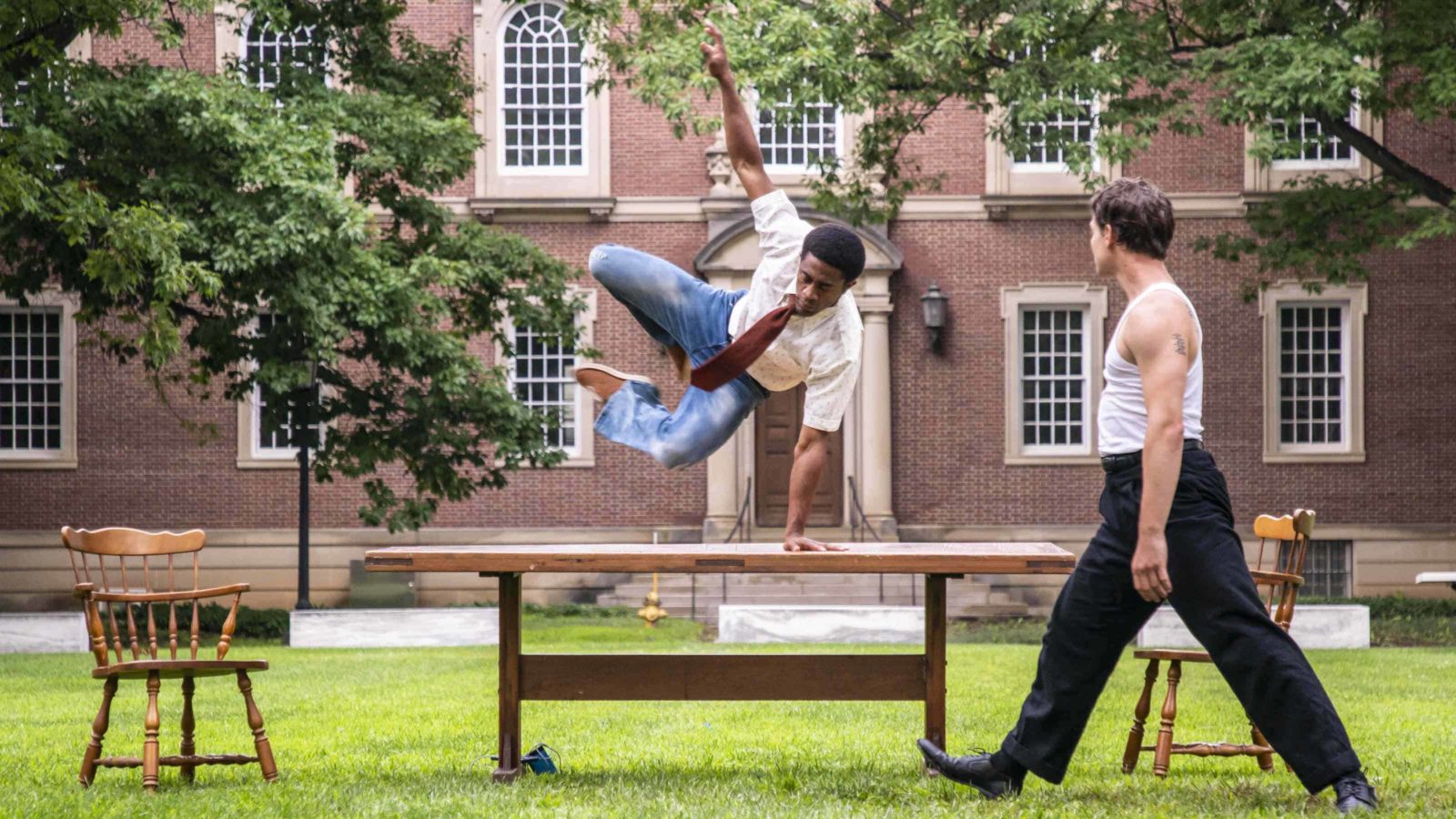In the dark on an early spring morning, students walked into a college building. They wanted places to live and eat and study where they could feel safe. They wanted a cultural center and ways to learn about the music and dance, history and politics, genius and leadership of their own people. They wanted an open conversation about how they were learning and wanted to learn. They wanted to be heard. And they were willing to risk their lives.
At 4:30 a.m. on Saturday, April 5, 1969, some 34 students from the Williams College Afro-American Student Society occupied the administrative offices in Hopkins Hall. On the anniversary of Martin Luther King Jr.’s assassination, as movements swept colleges across the country, Preston Washington, a young minister from Harlem, led his classmates into action.
They felt isolated in a world that would not recognize them, he told the Williams Record (the college newspaper) at the time — “It’s like being under a microscope,” said his vice president, Richard Jefferson.
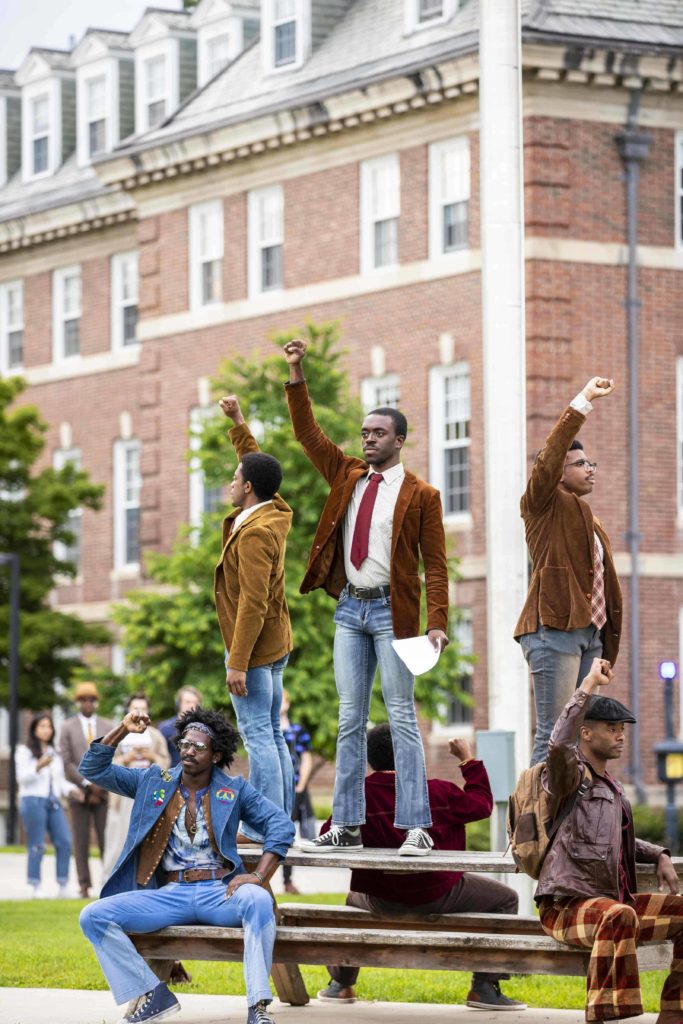
Performers invoke 1960s protests at Williams College in Alien/Nation at Williamstown Theatre Festival. Press photo courtesy of the theater.
Washington led the society into an open protest, and they found both support and stark hostility, said playwright Eric Berryman, an actor and creator based in New York and a member of the Forest of Arden theater company. He and his fellow company member and New York writer, Jen Silverman, and Forest of Arden will bring that time into the present in Alien/Nation, a new work with Williamstown Theatre Festival.
Alien/Nation is really two intertwined works, both outdoors, one built around a walk through campus and one on a drive through town. The walking performance will explore historic events, Berryman said, and the driving tour will follow similar themes into the present and future.
The play shows moments from those three days from different perspectives, he said: “You might see a meeting between Preston and the provost, a conversation between Afro-society members not knowing if they were going to occupy and if that’s the way, and the Provost and Preston speaking afterward … and a scene that’s timeless, that speaks to the emotional journey these characters are on.”
For three days that spring, the students debated with the college administration, until they reached an agreement in the small hours and emerged, tired and hungry — mopped the building, cleaned the desks and walked back to their own rooms with the seeds of an Africana Studies Department and a cultural center.
And the scenes from those days will unfold where they happened, Berryman said, or as close as the actors can come — on the grounds where these people walked.
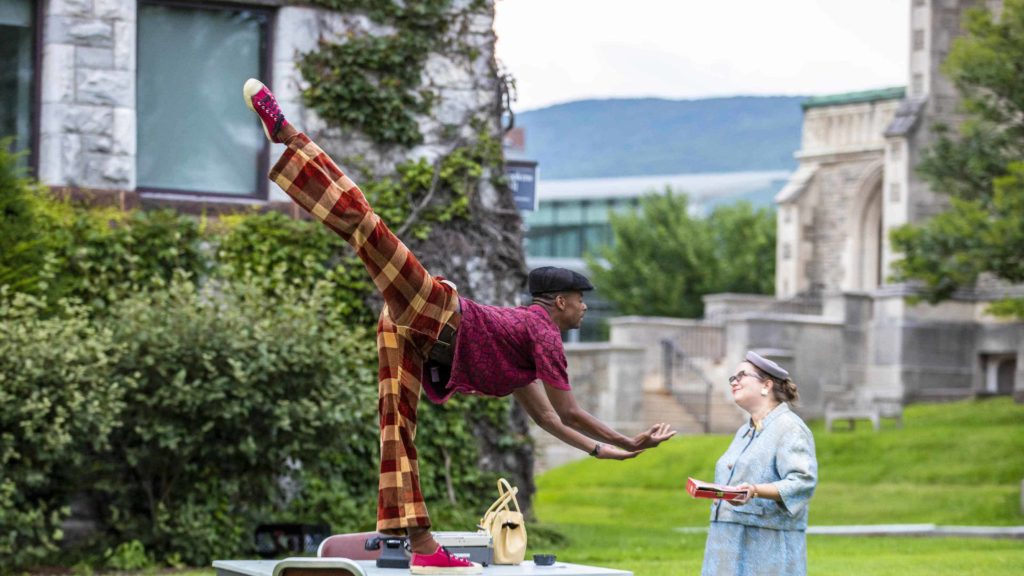
Jaime Lee Rodney and Debbie Warnock recall a moment Williams students and staff, as he dances in Alien/Nation at Williamstown Theatre Festival. Press photo courtesy of the theater.
Forest of Arden often creates work about centered in the communities where they perform, said founding company member Michael Arden, a two-time Tony-nominated director, including for his 2015 Broadway revival of Spring Awakening the musical with Deaf West Theatre in English and in American Sign Language.
“There’s something incredible about … letting people explore history through art,” Arden said, and 1969 was ripe with change, hope and pain — the Vietnam war, the moon landing, Freedom movements across the country.
“The things that were happening at Williams during that time were things that were happening all over,” Berryman said. “… I had family members that lived through this time.”
He feels a sense of recognition, when he finds records of Washington and his classmates talking about their experiences in their own words.
“This was something occurring on campuses all over,” he said, “and potentially, unfortunately, is still occurring. What these students are feeling is still felt. I was a black American on a college campus, not at a predominately black school, so there are certain things that I understand where they were coming from and felt myself.”
The performance will vary from once scene to another, he said, sometimes storytelling and sometimes more abstract, like the difference between a still-life and an expressionist painting that gives a visceral understanding of the feeling of the time.
“It’s dance-driven,” Arden said, “a kaleidoscope of moments told through movement.”
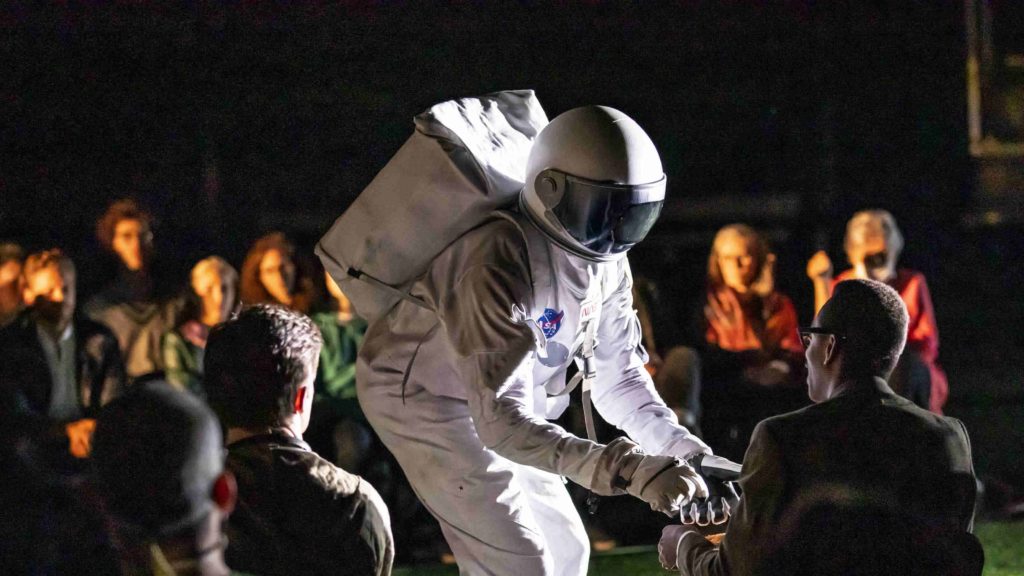
Oluwatobiloba Adeyemo appears as a visitor from space, or from a dream, or from the past, introducing a blend of history and science fiction in Alien/Nation at Williamstown Theatre Festival. Press photo courtesy of the theater.
He and his team have primarily researched through sources from the time, he said — they have reached out to alums involved in the occupation, but the play draws mostly on records from the Afro-American society, letters and articles in local and college newspapers.
Berryman sees Washington’s courage in them.
“I see him as such a product of his time in the most beautiful way,” he said, “doing something important because it’s the only thing you can do. He was fearless.”
And it took grit.
“When these student uprisings were happening, they were getting very violent,” he said, “and to go through this here and say ‘we still have to go through with this — people who are oppressed and feel alienated — something’s got to be better than what’s here, so I’ll do anything to reach something better and something different, because I can’t keep living like this anymore.”
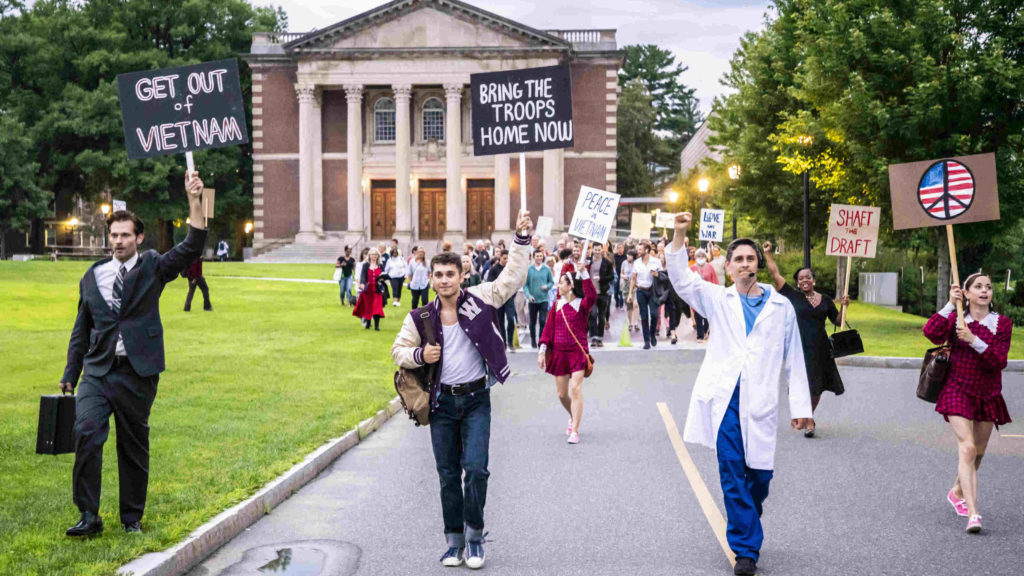
Performers invoke 1960s protests at Williams College in Alien/Nation at Williamstown Theatre Festival. Press photo courtesy of the theater.
Washington’s wife, Maria, was on campus with him, though Williams was still an all-male college — the first women students would come as exchange students in 1970, and the first Black women students in 1971. Berryman wonders what she thought and felt, and what Preston felt for her.
“She was a reminder of what he was fighting for, and a support,” he said. “She was pregnant during the occupation. I’m sure she was ever-present in his mind.”
Washington felt a responsibility, Berryman said, not only to the community at Williams he was leading, but to the larger Black American community, and as a soon-to-be-father.
“While this occupation was going on, the next generation was very real to him,” Berryman said. “He was going to be raising the next generation. When he was graduating in 1970, his son was eight months old.”
While these events play out on campus, people can watch a companion show from their cars — a broader look into the future and human connection. An exploration of space and new worlds becomes an exploration of contemporary stories.
The 1960s are also known for stories of aliens, Arden said, and these sightings inspired the company to think about what the idea of encountering people from another world can mean. In 1961, Betty and Barnie Hill, an interracial couple in New Hampshire, told a story of an alien encounter that caught national attention.
“A lot of the way we imagine aliens on film link back to this couple in 1961,” Arden said. “And what caused them suffering was not that they were abducted but that they were not believed.”
In this second performance, Forest of Arden has created a series of encounters and invited people to connect. They are looking into and challenging the word alien, Arden and Berryman said — looking into themes of alienation, not being seen, wanting to be seen, not wanting to be alienated.
People who have felt distanced, sometimes in the country they’re in or the country they came from, will tell their own stories: Immigrants, trans folk, queer folk, interracial folk … “We’re challenging people to meet people,” Arden said. “You’ll be hearing the stories of the performers you will see.”

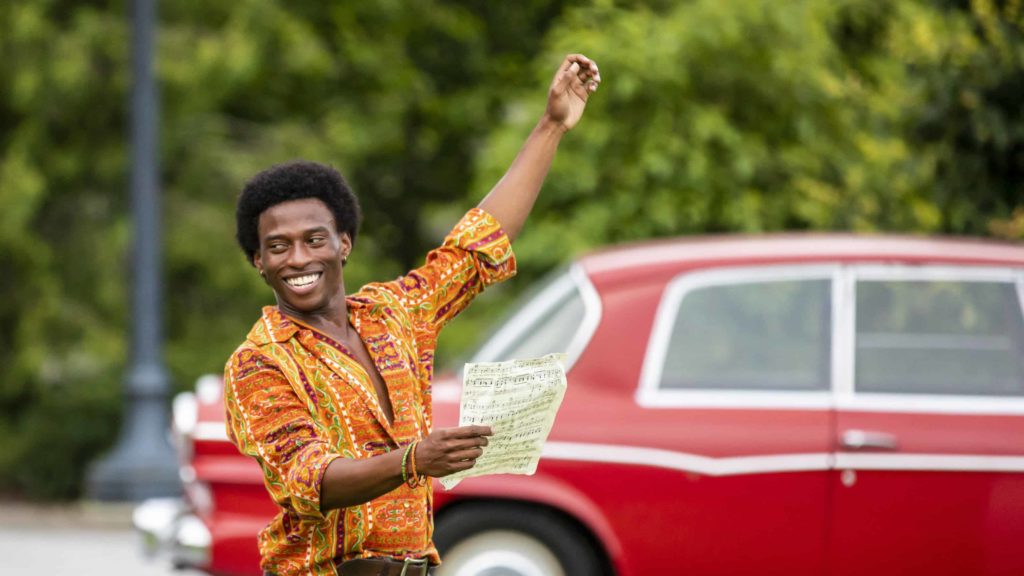
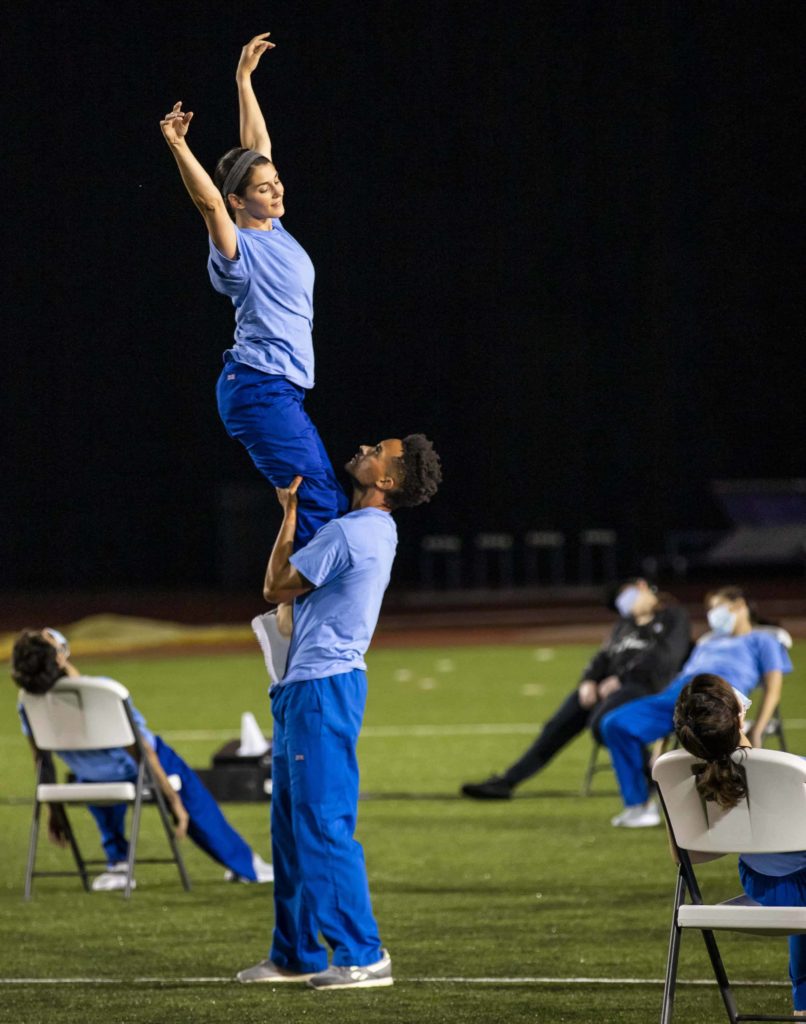
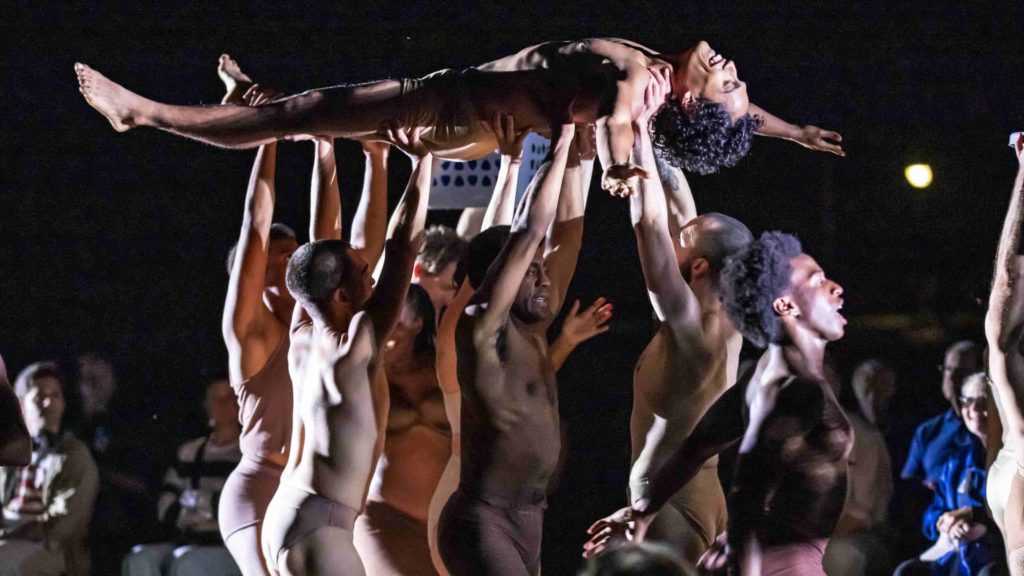
It’s a glimpse into their thoughts and desires and frustrations and day to day lives, he said: “What happens when someone says ‘this is who I am, I am trans, I am an American,’ and they are not believed?”
Knowing how people have acted in the past when they meet people knew to them, Berryman said, the show is asking, “How do we help each other, how do we welcome each other … and how have we failed?”
Looking back to the young men in Hopkins Hall, he is asking similar questions.
He wants to look at what those students fought for and ask, was it accomplished, and would they be happy with the way Williams is now. He sees schools and communities around the country wrestling with these questions now, facing the same human needs.
“Everyone wants to feel seen and heard and valued,” he said, “really.”
This story first ran in the Berkshire Eagle in July 2021 — my thanks to features editor Jennifer Huberdeau. In full disclosure, I also work a few hours a week as oral histories coorcinator for Williams College, gathering stories for the college archive, and I’m a Williams alum, class of 2000.

